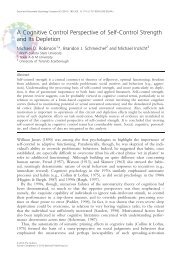Emotions and self-control 1 Incidental and Integral ... - Michael Inzlicht
Emotions and self-control 1 Incidental and Integral ... - Michael Inzlicht
Emotions and self-control 1 Incidental and Integral ... - Michael Inzlicht
Create successful ePaper yourself
Turn your PDF publications into a flip-book with our unique Google optimized e-Paper software.
<strong>Emotions</strong> <strong>and</strong> <strong>self</strong>-<strong>control</strong> 16<br />
gratification. Specifically, after writing about a personal accomplishment of which they were<br />
proud, participants were more likely to choose a gift card that could be used to buy entertainment<br />
supplies (an indulgent choice) versus a gift card that could be used to buy school supplies (a<br />
utilitarian choice). Thinking of a happy memory did not have a significant effect on gift-card<br />
choice compared to thinking of neutral events.<br />
In summary, the research suggests that emotions influence delay of gratification behavior<br />
in adults. Negative emotions mostly reduce delay of gratification, as was found in children.<br />
Positive emotions have more mercurial effects. The bulk of the evidence suggests that positive<br />
emotions render adults less likely to delay gratification, much like negative emotions do.<br />
However, inconsistencies in the literature justify caveats to this conclusion. Positive emotions<br />
may reduce delay behavior particularly among extraverts (Hirsh et al., 2010), or among neurotics<br />
who experience a drop in negative affect prior to the delay measure (Augustine & Larsen, 2011).<br />
And high arousal positive emotions may be more likely than low arousal positive emotions to<br />
reduce delay of gratification (see also Leith & Baumeister, 1996). Low arousal positive emotions<br />
have been observed to improve resistance to temptation (Fedorikhin & Patrick, 2010), as was<br />
typical in research with children, but also low arousal positive emotions have been found to have<br />
no significant effect on resistance to temptation (Wilcox et al., 2011).<br />
Why Do <strong>Incidental</strong> <strong>Emotions</strong> Influence Dieting <strong>and</strong> Delay of Gratification?<br />
In reviewing the research on the effects of incidental emotions on <strong>self</strong>-<strong>control</strong>, we found<br />
consistent evidence that emotions influence success at both dieting <strong>and</strong> delay of gratification,<br />
respectively. A summary of these results is on display in Table 1. Why do emotions influence<br />
<strong>self</strong>-<strong>control</strong> as they do?



